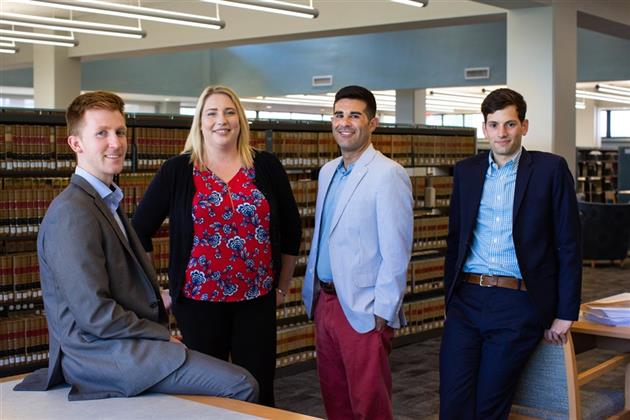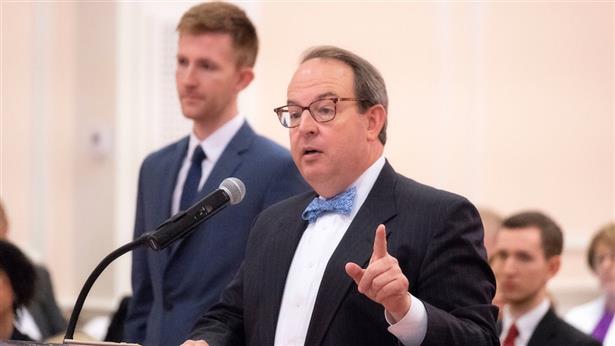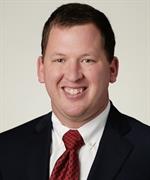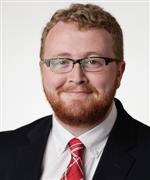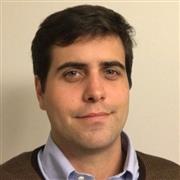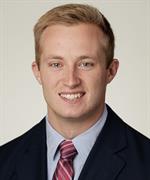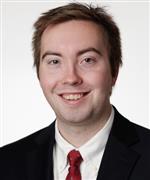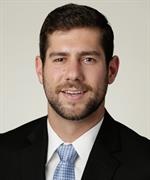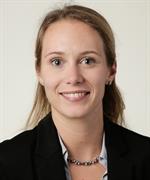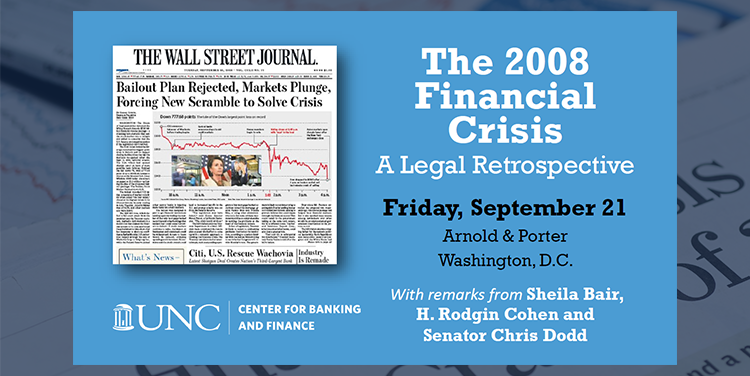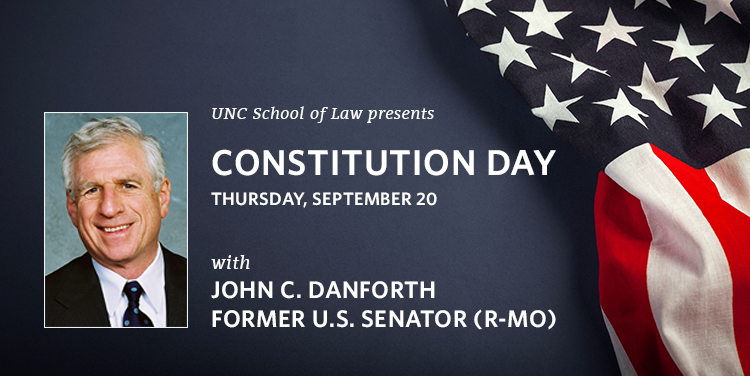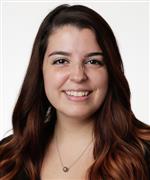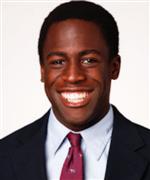![Entrepreneurship Students]()
Students who were involved in entrepreneurial activities before and during their time at UNC met with the director of the Kenan Charitable Trust last fall to begin talking about how the law school could use an entrepreneurship clinic. From left, Nick Haigh 3L, Stephanie Fields ’18, Brian Gamsey ’18 and Will Hayman 2L. Photo by Jeyhoun Allebaugh/UNC-Chapel Hill
What does it take to be an entrepreneur? It
takes drive, ambition, patience and persistence to identify a need and create a
business to fill that need. It also takes access to legal resources.
The William R. Kenan, Jr.
Charitable Trust recognizes that early-stage legal
counsel is critical to the success of new for-profit and nonprofit ventures. To
ensure that these ventures have access to legal counsel, the Kenan Trust has
made a $1.53 million gift to support the establishment of a clinical
entrepreneurship program at the University of North Carolina at Chapel Hill’s School
of Law. The program will provide rigorous,
hands-on training for the next generation of public-spirited lawyers while also
filling gaps in North Carolina’s entrepreneurship ecosystem. In addition to the
Kenan Trust, the North Carolina General Assembly has appropriated $465,000 in
recurring funds to support the program.
“We are thrilled and inspired by the
investment in the education of Carolina students that the Kenan Trust and the
people of North Carolina, through their representatives, are making,” said
Martin H. Brinkley '92, dean and Arch T. Allen Distinguished Professor at UNC School of Law. “Clinical
education geared toward organizational clients, and the business and social
entrepreneurs who establish them, is important to large numbers of our
students. The new entrepreneurship program will help Carolina Law embrace its
mission by fulfilling dual goals of teaching and service. With this generous
gift from the Kenan Trust and additional support from the state, we will be
able to provide an invaluable experiential learning opportunity for
approximately 30 students a year while serving several times that number of
for-profit and nonprofit entrepreneurial ventures each year.”
The new program will serve business and
social enterprise entrepreneurs on the campuses of UNC-Chapel Hill and North
Carolina State University, in partnership with UNC Kenan-Flagler Business School, NC State University’s Poole College of Management, as
well as the innovation and entrepreneurship infrastructures on both campuses.
The UNC School of Law also intends to identify one or more economic incubators
in underserved parts of North Carolina that the entrepreneurship program can
support.
In
addition to providing educational opportunities for law students, the program
will fill the one consistent gap across all startup settings: a lack of access
to legal counsel. Legal advice for early-stage businesses and nonprofits, which
typically have limited resources, is hard to find. In an effort to control
costs, too many entrepreneurs never consult a lawyer and come to regret it.
Failing to consult competent counsel exposes a new business or nonprofit organization
to a variety of risks. For clients of the program these risks will be lowered,
giving them a greater chance of thriving and expanding. In the end, students,
startup businesses, communities and the state’s economy will end up benefiting.
![Brinkley]()
Martin H. Brinkley '92, dean and Arch T. Allen Distinguished Professor at UNC School of Law, announces a $1.53 million gift for a new entrepreneurship program during the June Board of Trustees meeting. Photo by Jon Gardiner/UNC-Chapel Hill.
The state recognized the benefits of the
proposed program, appreciated the Kenan Trust gift and chose to show its
support through a $465,000 appropriation. “Connecting the world-class legal community at Carolina with business
professionals in the startup economy is a win-win approach to higher education
that will prepare law students to succeed and provide valuable legal resources
for emerging companies in our state’s rapidly growing economy,” said House
Speaker Tim Moore.
The program is expected to kick off in the
2019-2020 academic year. An official name will be determined during the
planning process with input from current students.
“The Kenan Trust has always focused on the
needs of the communities it serves and education is the foundation,” said
Douglas Zinn, executive director of the William R. Kenan Jr. Charitable Trust.
“We recognize that student education doesn’t just happen in the classroom and
we are excited to support the entrepreneurship program that will train law
students while strengthening North Carolina communities and the state’s
economy.”
Funding
will support three interwoven legal clinics at UNC School of Law: a for-profit
ventures clinic, an intellectual property clinic and Carolina Law’s existing Community
Development Law Clinic, which is a longstanding, highly successful nonprofit
social entrepreneurship clinic. Each clinic, supervised by a full-time member
of the law school faculty, will train eight to 10 law students per semester.
Students will counsel business founders on the advantages and disadvantages of
various business entity structures, form appropriate entities, draft
organizational documents, capture and license intellectual property assets, and
seek tax-exempt status for community based nonprofit organizations.
North
Carolina is consistently ranked as one of the nation’s top five places to start
a new business. Because of the rich and thriving entrepreneurial culture of the
Research Triangle Park area of North Carolina and the business schools and
entrepreneurial initiatives at local universities, the institute will serve a
pipeline of clients from potential partners across the state.
“This
gift and challenge from the Kenan Charitable Trust will catapult UNC School of
Law onto the cutting edge of legal education. From my own experience
representing clients in mergers and acquisitions and startups, there is a
great need for legal advice at the earliest stages,” said Larry Robbins '79,
partner at Wyrick Robbins Yates & Ponton LLP. “My hat is off to the Kenan
Trust and the North Carolina General Assembly for recognizing this need for an
entrepreneurship institute and for funding it.”
The gift from the Kenan Trust supports For All Kind: the
Campaign for Carolina, the most
ambitious fundraising campaign in the University’s history. The gift also
reinforces UNC School of Law’s commitment to train lawyer-leaders to address
the issues and questions of today’s dynamic, ever-evolving industries,
particularly in areas of growth and influence in North Carolina and beyond.
About the
University of North Carolina at Chapel Hill
The
University of North Carolina at Chapel Hill, the nation’s first public
university, is a global higher education leader known for innovative teaching,
research and public service. A member of the prestigious Association of
American Universities, Carolina regularly ranks as the best value for academic
quality in U.S. public higher education. Now in its third century, the
University offers 77 bachelor’s, 111 master’s, 65 doctorate and seven
professional degree programs through 14 schools and the College of Arts and
Sciences. Every day, faculty, staff and students shape their teaching, research
and public service to meet North Carolina’s most pressing needs in every region
and all 100 counties. Carolina’s more than 323,000 alumni live in all 50 states, the District of Columbia and 149
countries. More than 169,00 live in North Carolina.
-June 18, 2018


